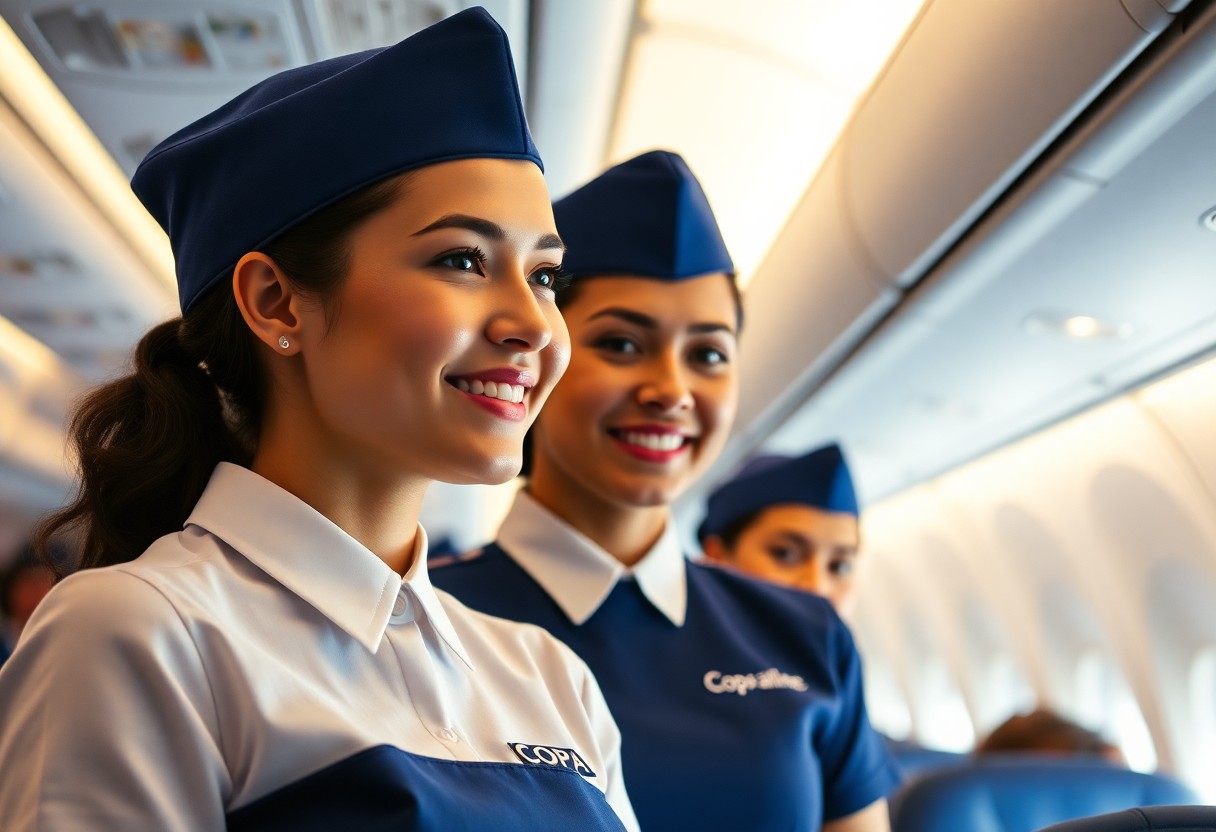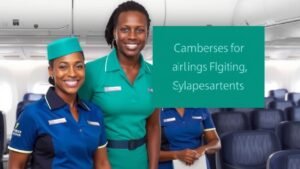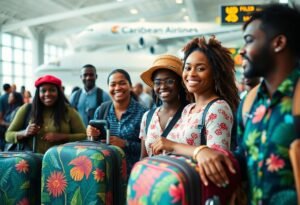With Copa Airlines cabin crew, you get a front-row seat to a high standard of service and professionalism in the aviation industry. Your experience as a passenger is greatly enhanced by the well-trained staff, who prioritize safety, comfort, and customer satisfaction. In this post, you will learn about the roles, responsibilities, and training processes that shape the dedicated team behind your journey with Copa Airlines, ensuring you feel supported and valued during your travels.
Key Takeaways:
- Copa Airlines cabin crew are known for their professionalism and customer service, ensuring a comfortable and pleasant flying experience for passengers.
- The crew undergoes extensive training that emphasizes safety protocols, cultural sensitivity, and language skills, reflecting the diverse routes Copa Airlines operates.
- Cabin crew members often participate in ongoing training and development programs to stay updated with the latest industry standards and enhance their service skills.
Overview of Copa Airlines
The Copa Airlines is the flag carrier of Panama, renowned for its extensive network across Latin America and the Caribbean. Established in 1947, the airline offers comfortable travel experiences and connects you to over 75 destinations worldwide through its main hub in Panama City. Its commitment to safety and quality service makes it a preferred choice for many travelers.
History and Background
Any discussion about Copa Airlines would be incomplete without mentioning its rich history. Founded as a small regional airline, it began operations in 1947 and later transformed into a major international carrier. Over the decades, Copa has expanded its fleet and destinations, significantly contributing to the growth of Panama as a prominent hub for air travel in the Americas.
Fleet and Destinations
To cater to its broad range of destinations, Copa Airlines operates a modern and diverse fleet, making it one of the most efficient airlines in the region. The airline’s fleet primarily consists of Boeing 737 aircraft, designed for short to medium-haul flights, ensuring a reliable travel experience.
Also, with more than 75 destinations across 30 countries, Copa Airlines ensures that your travel needs are met whether you are flying for business or leisure. Its strategic hub in Panama City allows for convenient connections, making it easier for you to explore Central and South America, as well as the Caribbean. You’ll appreciate the seamless travel experience as you journey through various cultures and landscapes with Copa Airlines.
Role of Cabin Crew
If you have ever traveled with Copa Airlines, you know that cabin crew members play an crucial role in ensuring your flight is safe and enjoyable. These dedicated professionals are responsible for maintaining a welcoming atmosphere while attending to your needs during the journey. Their extensive training and commitment to service are what help create an exceptional travel experience for you.
Responsibilities and Duties
Among the primary responsibilities of the cabin crew are ensuring passenger safety, managing in-flight services, and providing assistance during emergencies. They conduct safety briefings, serve meals and beverages, and address any concerns you may have throughout the flight. Their commitment to professionalism ensures you feel secure and comfortable while traveling.
Importance in Passenger Experience
Role of cabin crew extends beyond mere service; they significantly impact your overall experience during the flight. Their ability to create a friendly and accommodating environment can make a difference in how enjoyable your journey is.
Also, the way cabin crew members interact with you can greatly influence your perception of the airline. A smile, a helpful attitude, and attentiveness to your needs can turn an ordinary flight into a memorable one. Their role in fostering a positive ambiance enhances your travel experience, making you feel valued and cared for throughout your journey.
Training and Recruitment
Once again, you will find that Copa Airlines takes the training and recruitment of their cabin crew very seriously. The airline believes that well-equipped and knowledgeable staff are crucial in delivering an exceptional flying experience. As you explore this process, you will see how diligently they work to attract and prepare candidates for their roles, ensuring that only the best join their team.
Training Program Overview
On your journey with Copa Airlines, you will undergo an intensive training program designed to equip you with all the necessary skills and knowledge. This comprehensive training includes safety procedures, customer service, and cultural insights, making sure you are thoroughly prepared for the demands of your position in the skies.
Recruitment Process
Recruitment at Copa Airlines involves a systematic approach to select the best candidates for the cabin crew positions. The process is multi-faceted, including application reviews, interviews, and assessments to ensure that you embody the airline’s values and standards.
Plus, the recruitment process is tailored to identify individuals who excel in interpersonal skills, adaptability, and teamwork. You will be encouraged to showcase your unique experiences and qualities throughout the selection stages. Each step is designed to ensure you not only meet the technical requirements but also fit into the company culture that fosters a supportive environment for both employees and passengers alike.
Cabin Crew Uniforms and Appearance
Keep in mind that the appearance of Copa Airlines cabin crew reflects the professionalism and quality of the airline. Each detail of the uniform is designed to promote brand identity while ensuring comfort and functionality for the crew during their duties. This commitment to appearance is crucial for creating a positive impression and providing an excellent customer experience.
Uniform Design and Standards
Against a backdrop of evolving fashion trends, Copa Airlines has established a distinct uniform that embodies the spirit and culture of the airline. The uniforms are crafted from high-quality materials, blending style with practicality. This thoughtful design ensures that cabin crew members not only look polished but also feel comfortable throughout their shifts, enabling them to perform their roles effectively.
Grooming Expectations
Uniforms play an important role, but grooming also contributes significantly to the overall professional image of the cabin crew. To maintain high standards, you are expected to adhere to specific grooming guidelines that include neat hairstyles, minimal jewelry, and polished shoes. This attention to detail not only enhances your professional appearance but also fosters a sense of unity and pride among the cabin crew. Proper grooming helps create a visually appealing atmosphere that enhances passenger comfort and confidence in the airline.
Safety Procedures and Protocols
All Copa Airlines cabin crew members are established experts in safety procedures and protocols, ensuring that you feel secure throughout your flight. They undergo extensive training that covers various aspects of passenger safety, from handling in-flight emergencies to conducting safety briefings. This extensive preparation empowers crew members to react swiftly and effectively in any situation, making your well-being their top priority.
Pre-flight Safety Briefings
The safety briefing is an imperative component of your experience on Copa Airlines. Before every flight, cabin crew guide you through the safety features of the aircraft, including the location of exits, the use of seatbelts, and emergency equipment. These briefings serve to familiarize you with procedures, ensuring that you are prepared and informed for your journey ahead.
Emergency Protocols
By following established emergency protocols, Copa Airlines cabin crew effectively manage any potential in-flight incidents. They are trained to handle a variety of emergencies, ensuring that you stay safe and calm in challenging situations. Their expertise allows them to implement efficient procedures, providing you with support and guidance as necessary.
Another important aspect of emergency protocols is the crew’s commitment to ongoing training and simulations. This continuous preparation allows them to deal with various scenarios, such as medical emergencies, cabin depressurization, or evacuation procedures. Their ability to respond to these situations with confidence gives you peace of mind, knowing that skilled professionals are there to ensure your safety while you travel.
Customer Service and Interaction
For every flight, Copa Airlines cabin crew are dedicated to ensuring that your journey is both comfortable and enjoyable. They prioritize excellent customer service by greeting you warmly, attending to your requests promptly, and providing information throughout the flight. Your satisfaction is their ultimate goal, as they understand that positive interactions can significantly enhance your travel experience.
Managing Passenger Needs
Against the backdrop of diverse passenger expectations, Copa Airlines cabin crew skillfully manage your needs. They quickly assess and address any special requirements you may have, whether it’s helping families with young children or catering to dietary restrictions. Their attentiveness ensures that you feel valued and cared for, no matter the circumstance.
Handling Difficult Situations
Beside their strong focus on customer service, Copa Airlines cabin crew also excel in handling difficult situations that may arise during your flight. They are trained to stay calm and composed, even when faced with challenging passengers or unexpected issues.
A well-trained cabin crew helps diffuse tension and prioritize solutions during challenging moments. By using effective communication and empathy, they can transform a potential conflict into a positive experience. Whether addressing delays, managing seating disputes, or calming anxious passengers, their expertise ensures that your flight remains as pleasant and stress-free as possible.
Final Words
So, as you consider flying with Copa Airlines, take comfort in knowing that their cabin crew is dedicated to providing you with a safe and enjoyable flying experience. From their training in safety procedures to their commitment to excellent customer service, you can trust that your comfort and well-being are their top priorities. With a multicultural team fluent in several languages, you are sure to feel at home, no matter where your travel takes you.
FAQ
Q: What are the qualifications required to become a cabin crew member at Copa Airlines?
A: To become a cabin crew member at Copa Airlines, candidates generally need to meet several qualifications. These include being at least 18 years old, having a high school diploma or equivalent, and possessing strong communication skills in both English and Spanish. Previous experience in customer service or hospitality can be beneficial. Additionally, candidates must pass a medical evaluation and safety training programs offered by the airline.
Q: What is the training process like for new cabin crew members at Copa Airlines?
A: New cabin crew members at Copa Airlines undergo a comprehensive training program that covers a range of topics, including safety procedures, emergency protocols, customer service, and company policies. The training lasts several weeks and includes both classroom instruction and practical exercises, such as mock emergency scenarios. Crew members also learn about the airline’s fleet, onboard services, and how to assist passengers with various needs. Continuous training is conducted throughout their careers to keep them updated on new policies and regulations.
Q: What does a typical work schedule look like for Copa Airlines cabin crew members?
A: A typical work schedule for cabin crew members at Copa Airlines can vary significantly based on flight assignments, which may include short-haul and long-haul routes. Generally, flight attendants can expect to work varied shifts, including evenings, weekends, and holidays. While some may have regular schedules, others can experience more irregular hours based on operational demands. Crew members often have a mix of flight days and rest days, allowing them some flexibility in their personal lives.



